#she/her gipsy danger?
Text
While we’re on the subject of robots and machines integral to our childhoods…
If the Fabrication Machine is my husband, then Gipsy Danger is my WIFE

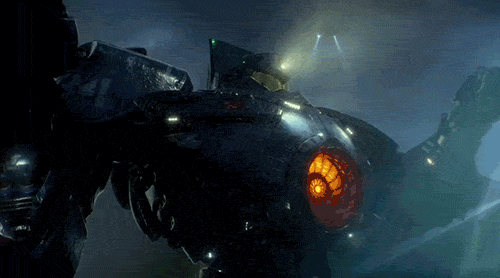
“It’s a mech” I DONT CARE I LOVE HER
LOOK AT HER
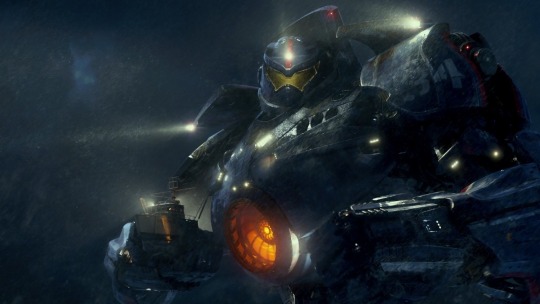
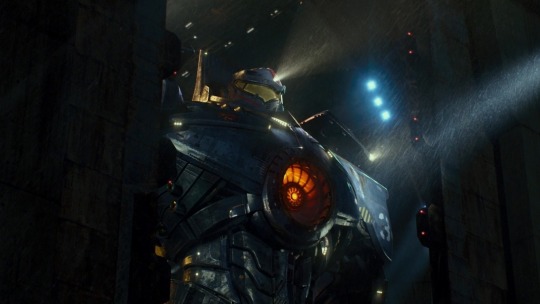
hey gorgeous. hey gorgeous. hey. How’s the. Weather. Up there.
#gipsy danger#GIPSY DANGER MY BELOVED#pacific rim#YEAHHHHHHG#I know it’s a mech#it technically isn’t alive#but one can dream right?#she/her gipsy danger?#hm?#how about it ladies what do we think#I gotta draw her#her Fabby and Glados were my babes as a kid#holy shit Gipsy please crush me please please please please please please PLEASEE please
25 notes
·
View notes
Text
I want to kiss that robot so bad
#gipsy danger#i lov eyouuu#so much#she is everything to me#little kiss on the forehead for her!!!!!#oighhhh#pacrim#egonkula rambling
4 notes
·
View notes
Text
When Raleighs having Not So Great feelings being back at the Shatterdome but his friendship with Mako and helping her grow as a pilot takes his mind off the trauma and allows them both to grow as people <3
#pacific rim#pacrim#raleigh becket#raleigh#mako mori#mako#gipsy danger#thoughts#i really like their friendship#how he mentors her but knows that she can hold her own#the mutual respect#how they work so well together#the has been and the rookie#i have many feelings about their friendship#and this movie
14 notes
·
View notes
Note
Now that there is a feminine Gipsy Danger in your Au, what is Gipsy Avenger like? (Idk if this was asked about already or not so I’m sorry if I missed it-)
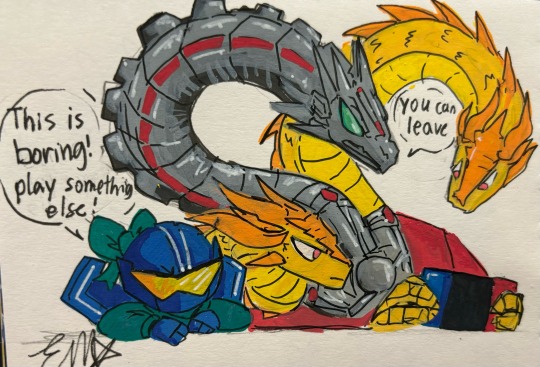
She’s a little fire cracker like her mom 💙
Also a first look at King ghidorah and G- Danger’s kids
#digital art#drawing#illustration#fanart#artists on tumblr#fantasy#art#web comic#legendary godzilla#oc#urban Kiju#urban kiju au#Godzilla#Godzilla au#king ghidorah#mecha king ghidorah#monsterverse#legendary monsterverse#monsterverse king ghidorah#pacific rim gipsy danger#pacific rim#gipsy avenger#gypsy danger#gypsy avenger
201 notes
·
View notes
Text
Rewatching Pacific Rim right now, and there's this tiny moment between Mako and Raleigh that I really love
Toward the beginning of the movie, before any of the main action, Mako is showing Raleigh around the shatterdome, introducing him to the newly-renovated Gipsy Danger
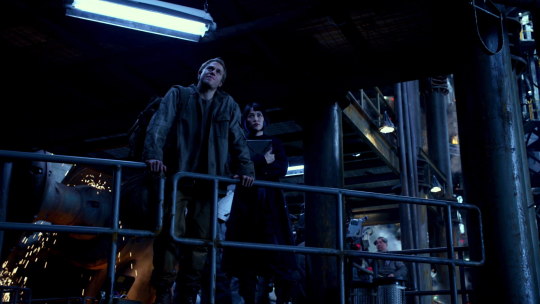
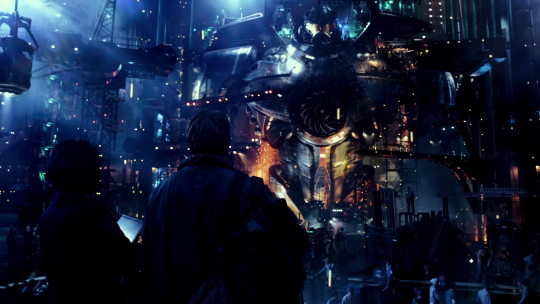
Directly after this, Mako shows Raleigh to his quarters and the two of them have this conversation:



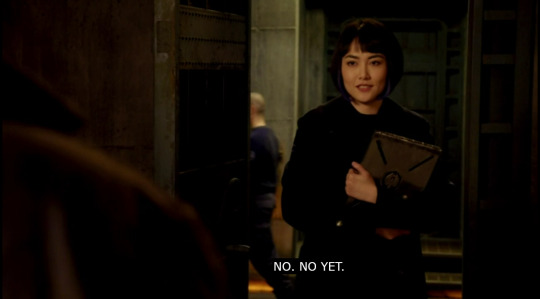

They talk a little more, Mako reveals her amazing simulator score, but also confirms that she is not one of the pilot candidates. They then discuss Raleigh's abilities. He asks Mako for her opinion - she thinks he is skilled but too unpredictable and reckless. She ends with this:

Raleigh thanks Mako for her honestly and says she may be right. Then goes on to say this:
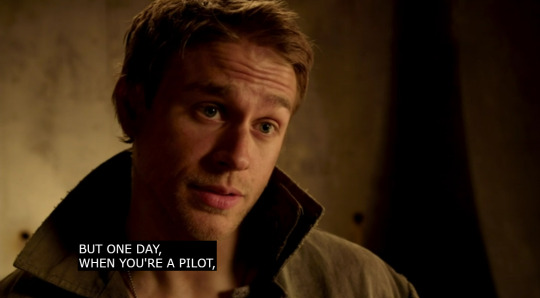
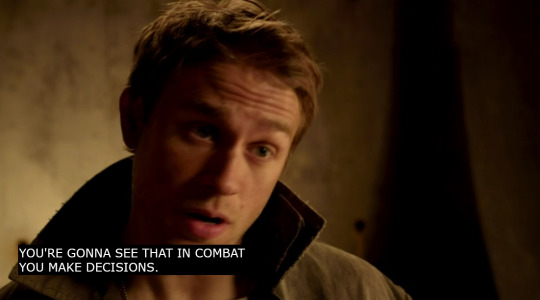

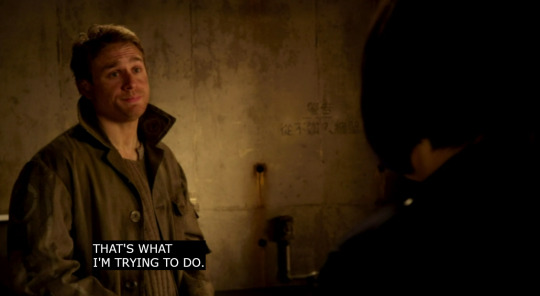
And the tiny detail in this scene that drives me crazy is right here

He says when. Not if, when. Mako has just explicitly confirmed that Marshal Pentecost is not considering her for Jaeger pilot. It has already been established at this point that there are only 4 Jaegers left anyway, and that the program is nearing its end, one way or another. In all likelihood, they have very little time left until the end of the whole damn world. Hell, Mako herself just criticized Raleigh, and he could very well wish to get back at her for that, were he a different person. AND YET, despite all of that, he says when. Raleigh has faith in Mako from the very, very beginning, before they even drift together, before he even sees her fight.
And that drives me crazy! I love their relationship so much
#pacific rim#pacrim#mako mori#raleigh becket#raleigh x mako#maleigh#sorry for the low quality screengrabs they're just straight screenshots I didn't do anything special#i love this movie#i know i am obsessed with newt and hermann but I do wish there was also more mako and raleigh fan stuff out there#ALSO raleigh is so repectful of Mako through the whole damn movie#like for real#I feel like most other movies would have the male protag be an asshole here#a woman he doesnt know very well just flat out stated that he's not the right person for the job#he could very easily do the wounded pride thing here and be a complete dick to her#i feel like most movies would go that route and the audience would be expected to find it understandable/justified#but NO! raleigh is respectful. he pushes back on her opinion but also thanks her for being honest and acknowledges that she may be right#i love del toro for that and I love these two so much
281 notes
·
View notes
Text
If you're thinking about reading the Pacific Rim novelization... you should know this first.
The only thing Alex Irvine's novelization of Pacific Rim is good for is scraping lore; and if you wanna do that, you have to compare it with all the other available text (Beacham's blog, creator interviews, Pacific Rim: Man, Machines, & Monsters, Tales From Year Zero, and Tales From The Drift) because some of the information is wrong or outdated. (Oh, and also, some of the information in PR:MMM is wrong or outdated. And Beacham occasionally hecks things up. You have to really compare your texts here.)
The novelization, you see, is just constantly like this:
Extra racism!
Nobody did embarrassment like the Japanese. Mako blushed
right to her hairline and bowed several times.
Pretentious prose over authentic emotion! (Also, bonus typo!)
Whenever he got to construct something, he had that crackle in his head… especially when he was about to do something as balls-out crazy as Drift with a sample of a dead kaiju. Swap neurotrasmissions with a silicate cerebellum. Open himself up to the alien alpha waves of a nonhuman sentience.
Casual misogyny!
Mako Mori was a puzzle, and she didn’t seem to be interested in letting anyone solve her.
Hanging lampshades on "problems" that only exist in Alex Irvine's mind!
“Everybody out of here, now!” Tendo Choi started yanking cables out of the control console, hoping to cause some kind of crash in Gipsy Danger’s systems. It occurred to him that he’d shouted in Chinese, but people seemed to have gotten the message.
Capitalist bootlicker Newt!
Newt was almost as surprised. The entire Pan-Pacific Defense initiative was funded by a black marketeer who recouped his investment by selling parts of the kaiju whose killing he had financed. And some of the parts were purchased by Kaiju Science! Newt probably had tissue and organs on his lab tables that came from this Hannibal Chau person.
Now that was a public-private partnership, Newt thought admiringly.
So yeah, if you're going to read the novelization, please know what you're getting into first. It's honestly one of the worst books I've ever read.
12 notes
·
View notes
Text
The missing arm and damaged leg of Gipsy Danger during Operation Pitfall were both on Raleigh's side (right side).
And even then he only accepted the orders to not go help Eureka because Pentecost called him Raleigh and almost begged him to listen. One arm and almost one leg gone on his side (remember what it did to him when Gipsy lost his arm fighting Knifehead) and Raleigh wasn't there to give up yet.
Some part of me thinks Mako convinced him through their drift connection to just listen to Pentecost and follow his last wish. He kept looking at Mako and telling her out loud what the mission required of them now, like if she as much as asked mentally, he would keep reaching for Eureka anyway.
#pacific rim#pacrim#pacific rim 2013#pacrim 2013#raleigh becket#mako mori#stacker pentecost#gipsy danger
33 notes
·
View notes
Text
Premonition
Ending the game was another nightmare. Even if it was the second one she participated in since the world changed into this parallel one where no man and no rule meant safety for its habitants, it still managed to affect her. Not that she hadn’t witnessed people dying before but those were mostly willingly involved in businesses that had a clear fate: wealth or death. These games, on the other hand, didn’t discriminate. They went for everything and everyone, including people that had never known true violence until they were face to face with the borderlands. Claire, a name she chose to call herself after her troubled past, took a deep breath before exiting the building. Even if the limit of the outside zone was erased, she still waited for the few survivors of the spades game to go past the laser. Always cautious, she learned to live like that. Couldn’t afford not to be, especially when she had been escaping her whole life. Born as a gipsy woman in Andalusia, member of a family reigned by one of the most powerful household heads, she grew up absorbed in their culture. Pride of her father, a beautiful daughter well versed in flamenco dance and with her own status, she was coveted by more than half of the best young privileged sons. But since she learned to read hands with the help of her beloved mother, she knew her fate didn’t augur well. She predicted the flight the night before it happened. One of her premonitory dreams made her understand there was no going back. And the following evening, after her father had hit her mother once more and left the house for night adventures, they escaped. All the way through Italy and similar nearby countries, they quickly realized Europe was not safe. The father’s network was too big and exhaustive and even if danger wasn’t around the corner, paranoia only increased with time after a sequence of “jumpscares” and they left the continent. And now here she was. Alone in Borderland, with five more days to live, watching carefully the actions of the group of men standing outside the building who had also played with luck and stregth on their side. One of them looked like their boss, muscular and stoic, he must have been a soldier or perhaps a policeman because he was the one taking down one of the armed “cowheads”. The other one was a little aside. quiet and maybe as vigilant as she was. His face looked sharp but gentle, confusing to say the least. Claire couldn’t help but chuckle silently at the sight of his blonde messy hair. These payos*. And the last one reminded her of a monkey. Too loud and obnoxious with far longer hair and piercings ‘adorning’ his face. But the monkey caught her attention the most because he let go of the knife in his belt and laid it on the ground to readjust his waist. Exactly what she needed. A weapon. It was risky but it was more dangerous to go around with nothing to defend herself. With a stealthy walk, Claire made her way out the building and behind the group, snatching the knife and running away. She knew she had been seen because the monkey alerted the rest of them and it didn’t take long to hear their steps following her. Joder*. Don’t stop. Whatever you do, don’t stop running.
* * *
Shuntaro stood there outside the game venue, taking in the moonlit sky and doing his best to drown out the mumblings of the already half-drunk Niragi, bragging about how he almost certainly is the strongest of all of the people gathered there. Ridiculous, Chishiya thought, if it is what he will have to listen to for all of their ride back to the Beach he will gladly walk.
Aguni, as it is in his nature, simply stood there with his arms crossed, eyeing his precious guard dog sternly, possibly hoping that it will work in calming him down. But, alas, all of the other survivors of the game leaving the venue glued their eyes towards him while he was performing this tirade, waving his assault rifle around, endangering everyone around him. Knowing this monkey it probably had the safety off.
Chishiya rolled his eyes and begged for something stimulating to his mind to show itself on the horizon. As if a sign from the gods the sign did appear but in form of a petit brunette woman of darker skin, crouched and crawling towards Niragi's knife that lay on the ground. He tilted his head and looked towards other participants, they didn't seem to notice her. Shuntaro had enough of Niragi's rambling's so he simply leaned on the nearby wall and smiled slightly. This should be interesting, he thought focusing his eyes on the woman. A few more seconds passed and to his surprise, she did manage to snatch the knife under Niragi but the victory didn't last long. The monkey turned towards the floor and begun rotating along his axis, looking for his posession anxiously.
"Who the fuck took my knife?" He yelled, eyeing the survivors that gathered around him
"That would be her." Chishiya chuckled arrogantly, pointing at the woman's brunette hair dissappearing into the alley nearby.
"And you didn't say anything? You'll pay for that, you bitch." Niragi's eyes narrowed as he clenched his jaw and then added, shouting. "Let's get her, first to catch her gets the VIP lonuge on me."
Soon a tremor of about a dozen feet ran in the direction of the nearby alley. She stood no chance, simple mathemathics. But the evidence shoved that she fought bravely because by the time Chishiya lazely sauntered over there he saw two militants clutching their faces - one of them bleeding from his nose and the other one, well, looked like the blackeye would look terrible in the morning. He pushed his way through the couple of men and saw Niragi holding the thief by the scruff of her neck, the barrel of the assault rifle caressing her chest, a threat and also a demonstration of Niragi's view on women.
"Hey, look what I caught — a little bird! Chirp if you're scared, birdy." He laughed viciously, tilting his head. "Now, has no one taught you that you're not supposed to take what's not yours?"
* * *
@little-lily-w
#in character#shuntaro chishiya#alice in borderland#chishiya shuntaro#alice in borderland rp#alice in borderland roleplay#aib#aib season 2#roleplay account#chishiya headcanons
24 notes
·
View notes
Text

Hello! If you see this, Gipsy Danger is protecting your dash, shes doing her best to keep the Kaiju at bay, and she would like to tell you to have a good day, and please take care of yourself.
This is Jaeger (3/4)!
#pacific rim#pacrim#jaegers#jaeger appreciation account#kaiju#pacific rim jaegers#protector#gipsy danger#fuck yeah robots!#robotappreciation#protecting your dash
32 notes
·
View notes
Text
The island
Claire was exhausted. She had been kept in a seated position on a cold dirty floor for 36 hours and the one time she demanded something comfortable to at least try and sleep, she was ‘gifted’ an ordinary pillow, almost as dirty as the floor was. The one wrist cuffed to the radiator was already bruised by the amount of twisting and squirming of the joint. Because Claire was, indeed, a fighter, and never in her life she would have surrendered without giving it her all to win.
The situation she was in was the fault of her father. She knew it before the kidnappers even explained anything. After she and her mother ran away from their home in Spain, the father, one of the most fearsome and powerful chiefs within the gipsy community, wasn’t going to let that slip. Getting the two women back became his first priority and being the violent and obsessive man he was, he didn’t hesitate about using all of his resources. Even if that meant sending dangerous men to search for the women around Europe.
The mother was lucky, Claire thought, because she wasn’t around when they kidnapped her at the local park. After they locked her up in that disgusting room, she was told that her father would be there in two days to take her and possibly interrogate her about the whereabouts of her mother. Judging by how much Claire knew him, she wouldn’t be surprised if he ordered the man to treat her like that as a way to punish her for trying to leave their community behind.
Her only hope was now her mother and she prayed to the Virgin of Macarena that she could figure out soon enough what happened to her daughter. However, even though Claire’s faith was weak because police would probably not take her case seriously, she didn’t know that her mother actually knew someone who could help her.
The man was just a phone call away.

@johnwick-forever
13 notes
·
View notes
Text
Up the Hill
for @christian-latte-anon, based on my response in this post
"What do you think about moving out of the city?" She asks, not hesitantly, but a little haltingly. Like she thinks he'll want to stay here, in their little apartment where they'd moved right after they got married, and she doesn't want to press it too hard. Neither of them has had one, solid place to stay for a very long time. Maybe it's time they did.
Raleigh's immediate, almost-before-she-finishes-her-sentence response is, "I've always wanted to build my own house."
Mako's whole face lights up, and then Raleigh mirrors her grin, and they're looking up properties for sale by evening. They don't care where it is, anywhere calm and safe where they can make a home. A place they can stay, for a very long time.
It's just outside a reasonably sized town, a place that looks like a snapshot picture taken long before the Kaiju War. The property is down a long driveway, up a long, mellow hill. It's fall when they sign the papers, and the leaves on the trees are vivid red as they drive through the valley. There's a foundation in place already, a framework in place for whatever they're going to build together.
They design it together, of course, with plans to build a detached garage later on — for tinkering, mostly Mako's, but to keep Raleigh's tools as well — and Raleigh starts building as soon as spring hits. He's always enjoyed this kind of work, though the majority of his experience is more industrial. Now, he's building using logs and timbers instead of metal beams and panels. It's different, but he likes it.
Mako climbs up onto the framework with him one day in the middle of the warmest summer he's experienced in years, and they eat lunch right there, looking down over the half-finished house the same way they'd looked out over Gipsy Danger in the Shatterdome almost five years before. How far, geographically, emotionally, relationally, they've come.
Raleigh has never been the best at domestics with anyone but his brother. There was an uncomfortable adjustment period, directly following their marriage, that neither of them had known what to do with a semi-normal life. They'd spent most of their time following the destruction of the Breach focused on cleanup and recovery efforts, still living in the Shatterdome for nearly a year afterwards.
Even when Raleigh had finally gotten up the guts to get down on one knee — which hadn't even surprised Mako, latent drift and all — they'd still been working out of one base or another, traveling around mostly together, but often not. The apartment was their first step back into a world where Jaeger pilots weren't needed any longer, and it was more like stepping down a set of stairs when you thought you were at the bottom already. Neither of them was prepared for what normalcy meant — grocery shopping, delegating household chores, Mako's twice-yearly need to rearrange all the furniture. It was intensely uncomfortable for about a month, before they finally, finally managed to relax into it, and into each other again.
Now, with a truck (and a car) packed full of boxes, ready to move in to a house that is solely, fully theirs, both of them are ready to tagteam making the bed, tidying the living room, checking for any final unwashed spoons (from sneaking ice cream) or mugs (late night tea) before sinking silently into bed. It's fall again, and according to the locals the first snow should hit soon — perfect timing for finishing a house. Raleigh convinces Mako halfway up the hill to let him carry her over the threshold.
His work building the house, along with past credentials that make a trail across coastal Alaska, catches the attention of some of the locals in town, and within another few months, Raleigh has a steady job working with a local construction company. Mako does not let him kiss her, or try to surprise hug her from behind — which doesn't work, anyway, he can't surprise her — until he's washed his hands. She's a hypocrite, the way her hands are often stained with grease from whatever vintage or otherwise car she's tinkering with, so half the time they both end up smeared with the residue of each other's labor.
They keep to themselves, there in their cabin up the hill, but they aren't hermits. Mako's mechanical engineering skills make her popular with the town's teenagers, particularly those looking for a skill to learn. If they're willing to drive — or, in some cases, bike — up the hill, they can fiddle around with her in the big detached garage with all her pieces and parts. One boy, a quiet, curious-eyed high schooler living with his aunt downtown, walks up the driveway in mid-September to show off a robotics project. That night, Mako sits at the kitchen island and makes a phone call to the school's principal.
"Do you have a robotics club?" She asks, not hesitantly, but unsure. She's still an outsider to many people here. She waves over her shoulder at Raleigh as he walks into the room, before he even says anything. When the principal says no, is there interest? Her face lights up and she replies, "I have interest in starting one."
So: Raleigh with his construction work to keep him from going stir-crazy and purposeless, Mako with her robotics club and a gaggle of teens around her — most of whom surpass her in height, which Raleigh takes far too much pleasure in pointing out and gets elbowed in the ribs over quite often — and a place they can stay for a very long time.
There's a secondhand shop in town, across the street from Raleigh's favorite grocery store. Their deal is that he does the grocery shopping, which Mako hates — "You take too long," she complains, "Just get what we need and be done!" — while she putters around the thrift store. The mantelpiece of their fireplace at home is cluttered with little trinkets and knickknacks.
Their second Christmas in the house they built up the hill, they drive out to a tree farm an hour away and pick a bushy, fragrant fir. Jake is coming for Christmas, Raleigh's invited Tendo too, and the fake tree they'd brought from the apartment and used last year currently resides in the garage for the robotics club kids to have a small celebration around. Mako has never had a live Christmas tree, and Raleigh suddenly feels as if he's failed her — so, a live tree they shall have.
It probably takes up too much space, but it fits, including a silver and gold star on the topmost point. Mako sits on Raleigh's shoulders to hook an absolutely ridiculous amount of ornaments — half of which were collected from the secondhand shop, little trinkets that probably meant something different to their original owners — to the upper section of branches. It isn't until a little too late that they realize they should have strung the lights around first.
"Save some for the kids to decorate the little tree," Raleigh says over his shoulder, heading into the kitchen to drop off empty hot cocoa mugs. He pauses, then, turns back. Mako is facing away from him, her hand hesitating over a branch, poised to hang another ornament. Her head is tipped to the side, as if she's thinking hard about something.
Something quiet prods at Raleigh's mind, but he can't discern it. Something about her kids, about the way he'd said it so casually — the kids are almost a constant presence, when they aren't holding meetings at the high school; both he and Mako have gotten used to the questions about Jaeger piloting by now — and it's playing along the edges of their remaining drift bond, a quiet loop that's more vague feeling than words.
Mako places the ornament, a silver and blue fish, on the tree, and Raleigh turns away again. He zones out a little bit, watching snow blow off the eaves just outside the kitchen window. Mako won't stay quiet if something is bothering her, but he doesn't think something is. For a moment, he considers refilling his cocoa cup, but it's probably not a good idea. He's driving to the airport in the morning to pick up Jake; a sugar high to keep him awake isn't much help.
Still, it's nearly midnight by the time the lights are strung — slightly tangled with ornaments — and the remainder of the decorations are safely in the garage, where the kids will spread glitter and goodwill on Christmas Eve night. Raleigh almost dozes off as soon as his head hits the pillow, the hot cocoa sugar high turning into a sugar crash, but that little thing is still bouncing around in his head. The kids; he'd said it unthinkingly, like a given — like he would talking about their kids, if they had any.
Mako is curled up asleep already against his side, and Raleigh is about to drift off and join her. He's going to pick up Jake in the morning, Tendo is coming the day after, the kids are going to decorate the little tree for Christmas Eve; it's going to be a busy week. The house up the hill is going to be slightly bustling in the way only holidays, no matter the amount of guests, can cause.
Neither of them has brought up the topic of starting a family yet, not hesitantly, not at all. Maybe it's time they did.
#love having two people who haven't really stayed still in A While actually try to settle down#it's SOOOOO hard#but so good!!!#have never written maleigh before but HHHHHHH i love them#also can you tell I'm extremely fond of the act of moving into a place? bc i am#also so fond of Christmas season I'm writing this in may but hey oh well#they deserve so much#also hhhsnsb raleigh tendo friendship brotp thanks and bye#also RIP i forgot i wanted to give them a big doggo until after i finished writing but like.#in the universe that lives in my head (way more detailed than this) they have a big bernese mountain dog#idk what his name is but i feel like tesla is a good one?? they're nerds ahddhsj#Lu writes#pacrim#pacific rim#mako mori#raleigh becket#maleigh
71 notes
·
View notes
Text
i wrote a pacific rim fic :3
its fairly short (just under 1k words) and is basically a dissection of the time between mako is ejected from gipsy danger and when her escape pod surfaces. fic under the cut :))
Orpheus
Eject.
The press of a single button was all it took to send Mako Mori hurtling into the endless, luminous abyss. As she fell, the angry crimson flashes of warning lights and electric hum of the dying Jaeger melted away into silent, slowly pulsating shades of blue, endless fractals of form and light cascading away into infinity. Pressing a hand up to the glass walls of the Con-Pod in awe, Mako lost herself for a moment as her eyes followed the contours and patterns of this sprawling dimension- arcs of energy and flickering movements just outside her line of sight that could have been life- before she snapped back to reality.
There was no time to look back.
Look back- no. She must not look back. There were only questions behind her now, panic that crept into the edges of her mind and tightened her chest. Mako drew in a deep breath, forcing herself to remain steady. All she could do was trust, trust that Raleigh would make it out alive. She could still feel traces of his mind in hers, a lingering whisper of the Drift that she couldn’t quite reach but that itched in the back of her mind nonetheless. She couldn’t look back, she couldn’t-
Don’t chase the rabbit.
-Mako whispered to herself; and suddenly she was back there again. A memory within a memory, lost in the Drift. She wandered the desolate city streets, trembling and clutching her shoe- the last fragment of the life that had just been torn away from her. Mako’s harsh, desperate sobs echo against the buildings full of corpses. Where was her home? Where was her family? What was this thing that lurked above her now, this dreadful creature that screeched and shook the earth and stared into her with vicious hunger? Mako screamed, and ran, and cowered, and prayed- and through it all, Raleigh watched her, begging her to return to herself, following her silently through the memory. She wanted to listen to him, to escape, but she-
She had to look back.
No.
She already knew how this ended. Mako had watched Onibaba’s chitinous leg snap her father’s spine with her own eyes, watched the flesh melt from her mother’s face as the fire swallowed her, felt the searing ash that fell from the sky like grim snow on her cheeks. Reliving it would change nothing.
With a slow, shaky sigh, she returned to the Con-Pod.
There was one constant in Mako Mori’s life, a point that everything else revolved around- nothing good could last. No matter what, no matter how desperately she protected and coveted her little pockets of contentment, there was nothing that the Kaiju couldn’t take from her.
Her birth parents, just two more casualties among millions.
Marshall Pentecost- her father- torn apart by radiation poisoning and self-sacrifice.
Gipsy Danger, her life’s work, left floating beyond space and time, its reactor on the brink of detonation.
Raleigh.
They were going to take Raleigh from her- she knew it all at once in that moment, she had poured her heart into him, opened her mind to him, followed him through the Breach and into this twisted dimension crawling with everything she hated, and it was all for nothing, because he was going to die, trapped in the flaming, spasming carcass of Gipsy Danger.
From far beneath Mako, deep within the place where she must not look, an explosion ripped through the otherworldly terrain, illuminating her field of view in terrifying yellow-orange. Ghostly screams tore through the air, a thousand hellish creatures crying out in agony as the fireball consumed them. The fabric of reality itself seemed to tremble.
Mako squeezed her eyes shut-
Don’t look back-
But the incandescent glow still ached, painting the space behind her eyelids in brilliant red.
Growing up in the Shatterdome, at the center of the apocalypse, Mako had learned to compartmentalize at an early age. Setting her feelings aside, tunnel vision on her work and nothing else- it was almost second nature- if she’d cried over every tragedy, nothing would ever get done. We are in the eye of a hurricane, Mako, Marshall Pentecost had once said to her, take care not to get swept up into the winds. He had done everything he could to instill that same stillness in her, that carefully controlled apathy that let him stand like stone in the eye of a hurricane, unmoving and unfeeling. Mako had admired him for it.
But he was dead now,
And Mako wept.
The breach opened up before her, its bright white glow flickering desperately as its edges began to collapse. Beyond it, the Pacific Ocean, and far above it, home.
Mako Mori did not look back.
10 notes
·
View notes
Text
26th May: Harriet has a crush
Read: Vol. 3, ch. 4 [40]; pp. 222–224 (“She had soon afterwards” to “danger of degradation”).
Read the post and comment on WordPress
Context
Harriet tells Emma that she is in love.
We know that this occurs “[a]bout a fortnight after the alarm” (p. 222), before the beginning of “June” (vol. 3, ch. 5 [41]; p. 224).
Note that the sections “Mind Over Matter” and “Services Rendered” contain spoilers.
Readings and Interpretations
The Unseen Seer
After today’s conversation with her friend, Emma “could not but hope that the gipsy, though she had told no fortune, might be proved to have made Harriet’s” (p. 222, emphasis original). Shaima Nima Mohammad argues that the “romance traditions that are related to the gypsies” are rendered ironically in Emma:
Emma’s disastrous propensity for matchmaking is set against gypsies’ status as fortune-tellers. In the beginning of the novel, Emma is seen as a fortune-teller when she predicts for the newly wedded Westons. Mr. Woodhouse confirms that Emma’s predictions […] are as good as any gypsy’s: “Ah! My dear, I wish you would not make matches and foretell things, for whatever you say always comes to pass” [vol. 1, ch. 1; pp. 5–6]. Later when she matches Elton and Harriet, Emma muses, “It would be an excellent match; and only too palpably desirable, natural, and probable, for her to have much merit in planning it. She feared it was what everybody else must think of and predict” [vol. 1, ch. 4; p. 21]. Once Emma assumes that Frank and Harriet are meant for each other, prediction and matchmaking conjoin with the gypsies. Emma notes that “she could not but hope that the gypsy, though she had told no fortune, might be proved to have made Harriet’s” [vol. 3, ch. 4 [40]; p. 222]. Here, Emma fills in the expectation about what the gypsies are to do, and she foretells in their stead. (pp. 656–7)
Here we may also recall Trumpener’s argument that the “gipsies” transform from characters who influence the narrative to discursive problem that influences characters in their absence (see “Interesting Consequences”); here, the “gipsy” is thought to have influenced events without being present, and without issuing an interpretation or proclamation on the level of narrative temporality (that is, telling a fortune) herself.
Mind Over Matter
Before the conversation that comprises this section begins, we are told that Emma “had previously determined how far she would proceed, on any application of the sort; and it would be safer for both, to have the judicious law of her own brain laid down with speed” (p. 223). Antonina Harbus argues that “[t]he relatively high frequency of the term ‘brain’ in the novel suggests [...] that the word is conceptually loaded”; it points to “a specific [embodied] view of consciousness in a text that is recognizably interested in both its heroine’s active imagination and also in her robust physical good health” (p. 770). Of this instance of the word, she writes:
The use of bodily terms for not only the emotional and rational faculties but also for imagination and perception presents a conflation of the concept of mind with the literal and figurative heart and the physical brain. The brain, though, exercises an ultimate controlling function over human consciousness. Austen uses legal terminology to define this relationship when ruminations on whether or not to press Harriet on the the latter’s new love interest are said to occur according to “the judicious law of her own brain”. (pp. 769–70)1
Similarly, David Meladie writes that “[t]he phrase suggests that her brain, instead of engaging responsively with its environment, behaves autocratically, like a judge who imposes the law” (p. 8). Juliet McMaster acknowledges this point, but emphasizes Emma’s “strenuous effort to recognize her own errors” (p. 32): “as we look around ourselves in this kingdom that is Emma’s mind, we can also recognize that it’s a place where the government may not always be just or wise, but it will be thorough and self-regarding, and the records will be kept scrupulously up-to-date.” In this instance, “it’s amusing to find [Emma] recognizing that she does lay down the law, for Harriet as well as herself. But she polices her own operations, and honestly keeps tally” (p. 31).
John Wiltshire, like Juliet McMaster, highlights what this episode reveals of Emma’s good qualities, while also pointing up the confusion that the combination of those good qualities with Emma’s “high-handedness” (p. 106) succeed in causing:
The comic episode of Harriet’s consigning to the flames the precious mementoes of her infatuation with Elton segues into another treatment of memory, when Emma overhears Harriet saying, more or less to herself, ‘I shall never marry’ [p. 222]. ‘Emma then looked up, and immediately saw how it was.’ And—as with Jane later—she does: her sympathetic feeling, her kindness, means that she picks up the emotional freight behind Harriet’s ‘serious tone’, and understands that she is reflecting on the impossibility of her marriage to an unattainable man. At the same time, she doesn’t see, since her assumption, conformable to her own wishes, is that Harriet is thinking of Frank. She wonders how to respond, and Austen presents her reflections as an interlacing of responsibility, scrupulousness and kindness with what the narrator at the beginning of the next chapter bluntly calls ‘connivance’. To paraphrase: Emma thinks that ‘If I say nothing, I’ll hurt Harriet. It’s better to be open about this.’ This kind thought is what leads her almost imperceptibly into encouraging Harriet to think of Frank and thence the crucial confusion around just who ‘he’ is […]. (pp. 115–6)
There is, I would add, some irony in the fact that the circumspection which Emma believes herself to have learnt from the Elton debacle (“against any thing like such an unreserve as had been, such an open and frequent discussion of hopes and chances, she was perfectly resolved,” p. 223) is the very thing that prevents disambiguation and thus leads into error in this instance. I am put in mind of conventional readings of Emma, which tend to hold that the novel has an iterative structure: the first volume has taught a lesson that is only incompletely learned by the second, and Emma’s ‘education’ is not ‘complete’ until the end of the third (see for example Hughes).
Services Rendered
Mary Hong gives an extended reading of this scene in which, “immediately following the discussion of Harriet’s souvenirs, we get a discussion between Emma and Harriet about Harriet’s new romantic interest”; the result of this discussion “is not the mutual understanding the participants believe they have, but a misunderstanding or misreading of one another’s meaning” (p. 250).
Emma, in response to Harriet’s confession that she is partial to someone, says “‘The service he rendered you was enough to warm your heart’” (E p. 223), while being careful to avoid naming names. Hong writes that
[t]he word “service,” like Harriet’s treasures, serves as a metonymy for the recollection of past events. But rather than refer to the same event, as both believe, the word (upon rereading) refers to completely different events. […] This non-mutuality of minds, already expressed in the recollections of the treasures, becomes thematized or consequential in that it leads to Emma’s encouraging Harriet’s hope in this unequal alliance (and thereby creating a romantic rival). More importantly, its appearance here shows again the danger that comes with reading for meaning—or thinking, as Emma does, that one knows what “service” means. For Austen, linguistic signs may refer to mental processes, but she parts company with Freud by not always making those signs readable, that is, accessible to other minds. (p. 250)
Hong’s central argument is that that details in Emma have an important narrative function that their trivialization (for example, in Miss Bates’s or Harriet’s speech) may hide from the reader. This conversation in particular contains a repetition that, given that “the medium of language is inseparable from the medium of material reality” (p. 251), is telling:
In the course of describing Mr. Dixon to Emma, Miss Bates mentions the “service he rendered Jane” on a boating trip in Weymouth, when Jane would have fallen into the water had not Mr. Dixon “caught hold of her habit” ([vol. 2, ch. 1 [19]; p. 102], emphasis added). That this moment should occur in Miss Bates’s telling of Jane’s letter not only links the devaluation of details and their important narrativizing role in two seemingly unrelated scenes, but connects the master plot of Harriet’s pairing with Frank Churchill/Mr. Knightley to the submerged plot of Jane’s pairing with Mr. Dixon/Frank Churchill. Both women are mistakenly matched to the man who has rendered them a “service” by saving them from physical harm, not to the man they actually love or admire. Through this linguistic and structural mirroring, we gain access to the central mystery of the novel—the story of Jane and Frank’s relationship. As a dramatization of the pitfalls of reading for meaning (which Emma commits over and over again), Emma’s and Harriet’s misunderstanding suggests that details do not so much access subjective depth as narrative depth through an attentiveness, to use Miss Bates’s words, to “what is before [us].” The result is a submerged plot that is, at the same time, in plain sight. (pp. 250–1)
Footnotes
In particular, Harbus argues that Emma represents a turn in Austen towards seeing the mind as biologically determined in addition to socially constructed that would be further developed in Persuasion. Emma’s moral development thus involves learning to understand the mind as situated in the body and to privilege physical signs (such as blushes) as sites for interpretation, rather than making assumptions about others’ minds.
Discussion Questions
What is the signifiance of the thought about the “gipsy” that prefaces this episode?
What model of relationship between the “mind” and the “brain,” or the “mind” and the “body,” is presented in Emma?
What motivates Emma and Harriet throughout this conversation? Are there any other points of humor or irony that you notice?
Bibliography
Austen, Jane. Emma (Norton Critical Edition). 3rd ed. Ed. Stephen M. Parrish. New York: W. W. Norton & Company, [1815] 2000.
Harbus, Antonina. “Reading Embodied Consciousness in Emma.” Studies in English Literature, 1500-1900 51.4 (Autumn 2011), pp. 765–82. DOI: 10.1353/sel.2011.0040.
Hong, Mary. “‘A Great Talker upon Little Matters’: Trivializing the Everyday in Emma.” Novel: A Forum on Fiction 38.2/3 (Spring – Summer 2005), pp. 235–53. DOI: 10.1215/ddnov.038020235.
Hughes, R. E. “The Education of Emma Woodhouse.” Nineteenth-Century Fiction 16.1 (June 1961), pp. 69–74.
McMaster, Juliet. “Emma: The Geography of a Mind.” Persuasions 29 (2007), pp. 26–38.
Meladie, David. “‘Myself Creating What I Saw’: Sympathy and Solipsism in Jane Austen’s Emma.” English Studies in Africa 56.2 (2013), pp. 1–13. DOI: 10.1080/00138398.2015.856553.
Mohammad, Shaima Nima. “The Gypsy Role as a Plot Device of Romance in Jane Austen’s Emma.” International Journal of Innovation, Creativity and Change 12.5 (2020), pp. 653–63.
Trumpener, Katie. “The Time of the Gypsies: A ‘People without History’ in the Narratives of the West.” Critical Inquiry 18.4 (Summer 1992), pp. 843–84. DOI: 10.1086/448659.
Wiltshire, John. “Emma: The Picture of Health.” In Jane Austen and the Body. Cambridge: Cambridge University Press (1992), pp. 110–54. DOI: 10.1017/CBO9780511586248.005.
23 notes
·
View notes
Text
KAIJU KRUSH
TITANIC 12... COMPLETE
The S-Class 6 is bearing down on us, but first let's salute the strange beasts that were terminated in the Titanic 12!

KING KONG
The sovereign of Skull Island defeated fellow Hollywood monsters Godzilla '98 and Cloverfield, but suffered back-to-back losses against super-heavyweights Ghidorah and Ultraman. Kong's no stranger to punching above his weight class, but there's only so much brains, brawn and bravery can do against gravity beams, spacium blasts, and cosmic carnage.

EVA-01
EVA-01 started the Krush by putting up an impressive fight against Monster Zero. The mutant machine made a real Third Impact in the loser's bracket by stomping Voltron, Goldar and Gyaos clean out of the competition. Ultimately Mothra soothed the savage cyborg's soul, demolishing EVA-01 in one of the Krush's biggest, most surprising blowouts.
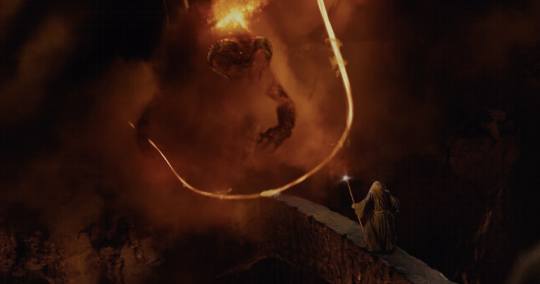
BALROG
Tolkien's terrible fantasy phantom unsurprisingly ruled over the underworld that is the Kaiju Krush loser's bracket, whipping the 50 ft Woman, Cloverfield, and Gorgo out of the tourney. Blackest magicks and scorching hellfire are bad-ass powers to wield, but you can't do much with them if a fucked-up sword-faced shark alien cyborg blasts down from outer space and cuts your fucking head in half.
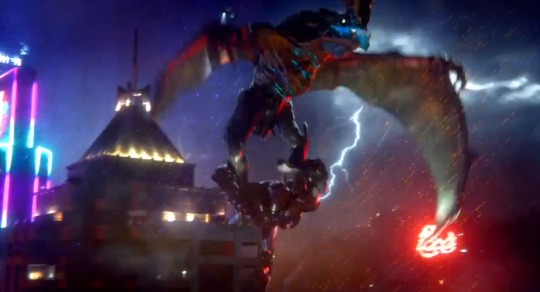
OTACHI
Pacific Rim's polymorphous, prehensile-tongued predator started strong, but was savagely shot to pieces by kaiju top guns Rodan and Gamera. Not the victory she and her clutch of squirming fetuses had hoped for, but still a respectable run: everybody's OTHER favorite kaiju mom stayed in the Krush twice as long as her Pacific Rival, Gipsy Danger.
Stay tuned for more Kaiju Krush! The S-Class 6 are next, and that means we're on the precipice of FINAL WAR! Who will claw their way to the top, and who will get slam fucking dunked into an active volcano? Do any of these monsters really have a chance against Godzilla? Only one way to find out!
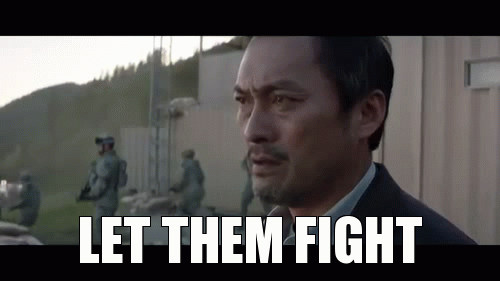
2 notes
·
View notes
Note
do u have any otachi/kodachi headcanons?
At last, another chance to talk about the Kaiju Adoption AU!
Early on Kodachi has like, the worst separation anxiety imaginable. She REFUSES to be kept away from Newt for any reason, for any length of time. So she just grabs him with her tail and carries him around everywhere she goes for a few weeks. Newt gets used to this surprisingly quickly.
This becomes a common interaction:
Newt: Hey, Raleigh.
Raleigh: Hey, Newt.
Raleigh:
Raleigh: So... where is she taking you?
Newt: I’ll find out when I get there :)
She really, really doesn’t like Mako and Raleigh. Her first memories of them are Otachi’s fight with Gipsy Danger. She keeps drawing back and hissing whenever they get too close. For their part, Mako and Raleigh just avoid her as much as possible.
3 notes
·
View notes
Note
on the matter, do you agree that it is possible to make political points of very different political positions analyzing the same parts Wuuthering Heights through different ideologicals lens? Like that it is possible to read it as both as racist text and a text about the danger of treating children with prejudice based on their race/skin color/appearance/birth/gender etc.
Yes, I definitely think that, as I have read both racist and anti-racist interpretations of it. I think it is a complex enough text to support any ideological position.
That being said, I think hatefully racist readings would have to ignore a lot in the book to make sense, since the book is sympathetic to Heathcliff at various points. The more racist readings of WH actually seem to be somewhat sympathetic to Heathcliff and to fetishize his race more than anything, like A. Mary F. Robinson’s, Charlotte Brontë’s or Gilbert and Gubar’s:
“It has been laid as a blame to her that she nowhere shows any proper abhorrence of the fiendish and vindictive Heathcliff. She who reveals him remembers the dubious parentage of that forsaken seaport baby, "Lascar or Gipsy;" she remembers the Ishmaelitish childhood, too much loved and hated, of the little interloper whose hand was against every man's hand. Remembering this, she submits as patiently to his swarthy soul and savage instincts as to his swarthy skin and "gibberish that nobody could understand." From thistles you gather no grapes.
No use, she seems to be saying, in waiting for the children of evil parents to grow, of their own will and unassisted, straight and noble. The very quality of their will is as inherited as their eyes and hair. Heathcliff is no fiend or goblin; the untrained doomed child of some half-savage sailor's holiday, violent and treacherous. And how far shall we hold the sinner responsible for a nature which is itself the punishment of some forefather's crime. Even for such there must be rest. No possibility in the just and reverent mind of Emily Brontë that the God whom she believed to be the very fount and soul of life could condemn to everlasting fire the victims of morbid tendencies not chosen by themselves. No purgatory, and no everlasting flame, is needed to[Pg 160] purify the sins of Heathcliff; his grave on the hillside will grow as green as any other spot of grass, moor-sheep will find the grass as sweet, heath and harebells will grow of the same colour on it as over a baby's grave. For life and sin and punishment end with death to the dying man; he slips his burden then on to other shoulders, and no visions mar his rest.” (Robinson)
“Heathcliffe [sic], again, of Wuthering Heights is quite another creation. He exemplifies the effects which a life of continued injustice and hard usage may produce on a naturally perverse, vindictive, and inexorable disposition. Carefully trained and kindly treated, the black gipsy-cub might possibly have been reared into a human being, but tyranny and ignorance made of him a mere demon. The worst of it is, some of his spirit seems breathed through the whole narrative in which he figures: it haunts every moor and glen, and beckons in every fir-tree of the Heights.” (Charlotte Brontë)
“The sons of Urizen were born from heaven, Blake declares, but “his daughters from green herbs and cattle, / From monsters and worms of the pit.” He might be describing Heathcliff, the “little dark thing” whose enigmatic ferocity suggests vegetation spirits, hell, pits, night �� all the “female” irrationality of nature. Nameless as a woman, the gypsy orphan old Earnshaw brings back from the mysterious bowels of Liver/pool is clearly as illegitimate as daughters are in a patrilineal culture. He speaks, moreover, a kind of animal-like gibberish which, together with his foreign swarthiness, causes sensible Nelly to refer to him at first as an “it,” implying (despite his apparent maleness) a deep inability to get his gender straight. His “it-ness” or id-ness emphasizes, too, both his snarling animal qualities — his appetites, his brutality — and his thingness. And the fact that he speaks gibberish suggests the profound alienation of the physical/natural/female realm he represents from language, culture’s tool and the glory of “spirits Masculine.” (Gilbert and Gubar)
I think the racism in readings of Wuthering Heights are less due to active hatefulness and more due to fetishization. As these passages from the essay “Heathcliff as Fetish in Wuthering Heights” point out:
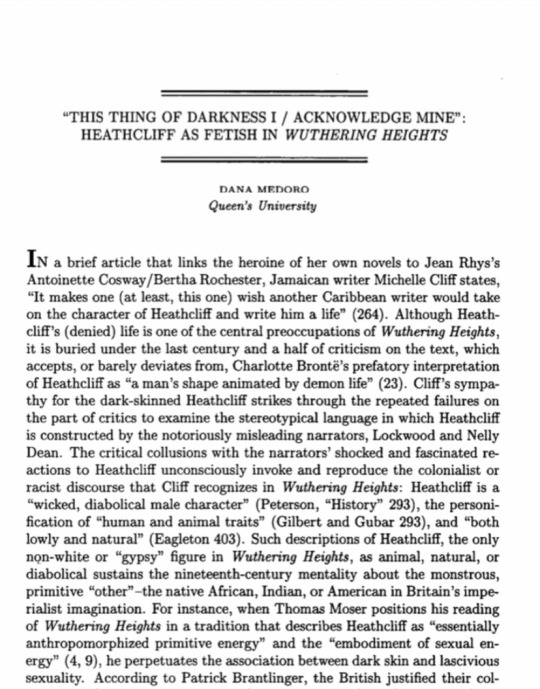
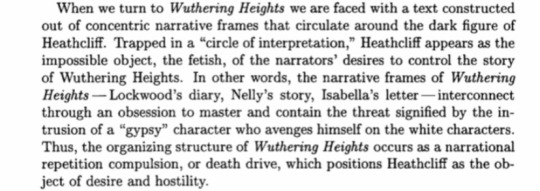

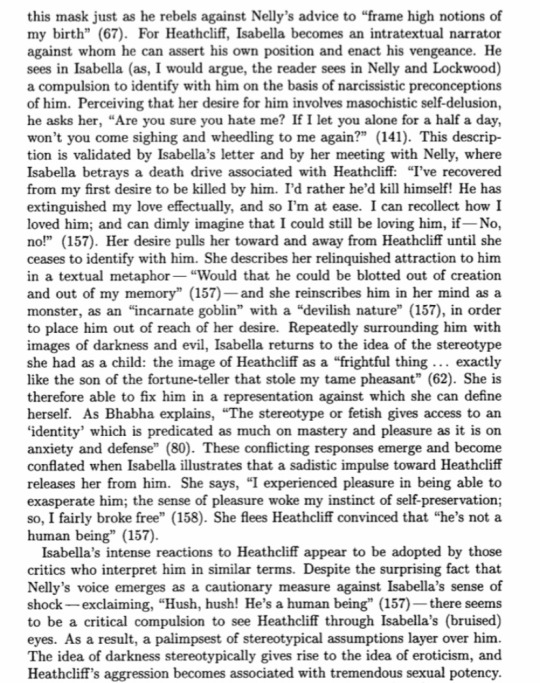
5 notes
·
View notes